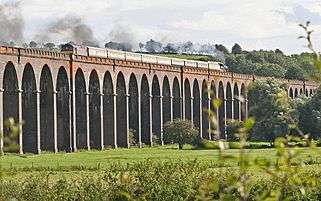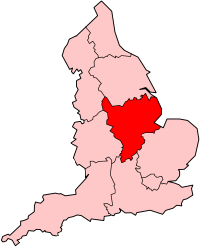Oakham–Kettering line
The Oakham–Kettering line is a railway line in the East Midlands of England. Currently it has one passenger station in operation, at Corby.
| Oakham–Kettering line | |
|---|---|
 | |
| Overview | |
| Type | Inter City, Heavy rail |
| System | National Rail |
| Status | Operational |
| Locale | East Midlands |
| Termini | Glendon (Kettering North) Junction Manton Junction |
| Stations | 1 |
| Operation | |
| Owner | Network Rail |
| Operator(s) | East Midlands Railway GB Railfreight Freightliner |
| Rolling stock | Class 43/HST Class 222 "Meridian" |
| Technical | |
| Number of tracks | One-Two |
| Track gauge | 1,435 mm (4 ft 8 1⁄2 in) standard gauge |
| Loading gauge | W7[1] |
| Electrification | 25 kV 50 Hz AC OHLE (Corby to Kettering) |
| Operating speed | Below 100 mph (160 km/h) |
Oakham–Kettering line | ||||||||||||||||||||||||||||||||||||||||||||||||||||||||||||||||||||||||||||||||||||||||||||||||||||||||||||||||||||||||||||||||||||||||||||||||||||||||||
|---|---|---|---|---|---|---|---|---|---|---|---|---|---|---|---|---|---|---|---|---|---|---|---|---|---|---|---|---|---|---|---|---|---|---|---|---|---|---|---|---|---|---|---|---|---|---|---|---|---|---|---|---|---|---|---|---|---|---|---|---|---|---|---|---|---|---|---|---|---|---|---|---|---|---|---|---|---|---|---|---|---|---|---|---|---|---|---|---|---|---|---|---|---|---|---|---|---|---|---|---|---|---|---|---|---|---|---|---|---|---|---|---|---|---|---|---|---|---|---|---|---|---|---|---|---|---|---|---|---|---|---|---|---|---|---|---|---|---|---|---|---|---|---|---|---|---|---|---|---|---|---|---|---|---|
| ||||||||||||||||||||||||||||||||||||||||||||||||||||||||||||||||||||||||||||||||||||||||||||||||||||||||||||||||||||||||||||||||||||||||||||||||||||||||||
Current service
Corby railway station is served by one train per hour to and from London St Pancras via Kettering, Wellingborough, Bedford and Luton.[2] The minimum journey time between Corby and London is 1 hour and 14 minutes.[2] There is a limited service north of Corby to Derby via Oakham, Melton Mowbray[3] and East Midlands Parkway.
History
The line was built in the 19th century as part of the Midland Railway. Its most notable engineering features are the Welland Viaduct (also called Harringworth Viaduct) and Corby Tunnel. The line was a major part of the Midland Main Line between London St Pancras, Nottingham, Leeds and Carlisle carrying named expresses such as The Waverley.
The line was opened for goods traffic on 1 December 1879[4] and for passenger traffic on 1 March 1880.[5]
British Railways withdrew passenger services in 1967.[6] Thereafter BR used the line mainly for freight traffic, and as an important diversionary route for Midland Main Line passenger trains during disruption or engineering work.
In 1977 the Parliamentary Select Committee on Nationalised Industries recommended considering electrification of more of Britain's rail network.[7] By 1979 BR presented a range of options to do so by 2000,[8] some of which included the Oakham to Kettering and Birmingham–Peterborough lines.[9] Under the 1979–90 Conservative governments that succeeded the 1976–79 Labour government, the proposal was not implemented.
Corby railway station was reopened in 1987 with a shuttle service between there and Kettering, but the service had a poor timetable and unreliable trains which led to the service being withdrawn in 1990. A Corby-Kettering bus shuttle connecting with trains was introduced in August 1996.
A new Corby station opened on 23 February 2009, initially served by one return train per day to London St Pancras, operated by East Midlands Trains.[10] A fuller service, with 13 daily return trains to London, started on 27 April 2009.[2] Two trains per day in each direction extend north of Corby to Oakham and Melton Mowbray,[3] one of which continues to East Midlands Parkway and Derby.
Electrification
The section of line between Bedford, Kettering and Corby is being electrified during 2019.
References
- "Loading Gauge". East Midlands RUS (PDF). London: Network Rail. p. 55. Archived from the original (PDF) on 7 June 2011. Retrieved 1 August 2010.
- "East Midlands Trains announces start date for full services from Corby". East Midlands Trains. 2009-04-07. Archived from the original on 2010-03-10. Retrieved 2009-05-04.
- "Passengers from Oakham set to benefit from direct link to London". East Midlands Trains. 2009-04-07. Retrieved 2009-05-04.
- "A new line of railway". Sunderland Daily Echo and Shipping Gazette. England. 1 December 1879. Retrieved 23 September 2017 – via British Newspaper Archive.
- "Midland Railway Opening of the Kettering and Manton Line". Rutland Echo and Leicestershire Advertiser. England. 27 February 1880. Retrieved 23 September 2017 – via British Newspaper Archive.
- Passengers No More by G. Daniels and L. Dench second edition page 65
- Anonymous 1979, p. 0.
- Anonymous 1979, p. 2.
- Anonymous 1979, p. 8.
- "East Midlands Trains announces first trains for Corby". East Midlands Trains. 2009-02-17. Retrieved 2009-05-04.
Sources
- Anonymous (Winter 1979). Railway Electrification. British Railways Board (Central Publicity Unit). pp. 0–2, 8.
